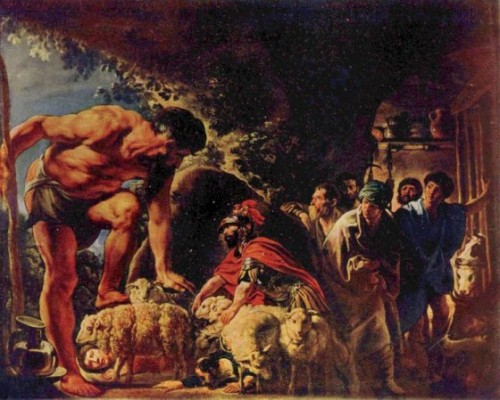Polyphemus
The Giant that Odysseus fought
The myth of Odysseus and the Cyclops is one of the most known Greek myths, narrated by Homer in his Odyssey.
The myth of Odysseus and the Cyclops is about the one-eyed, giant Cyclops who menaced and almost put an end to the hero Odysseus. The Cyclops is one of the memorable characters of Greek mythology.
Odysseus and his shipmates encountered the Cyclops on their ill-fated return from the Trojan War.
The Return of Odysseus from Troy
This nine-year conflict pitted the Greeks against the city of Troy, on the western coast of what is now Turkey. The Greeks had finally triumphed, but many would not live to enjoy it.
Odysseus’s shipmates were blown far off course, and after a number of perils they reached a small wooded island, where they beached the vessels and gave thought to provisions.
Odysseus had noticed a larger island nearby, from which came the sound of bleating goats. This was encouraging to his growling stomach, and he detailed a scouting party and led it to the far shore.
Here they found a huge goat pen outside a cave and, inside, all the cheeses and meat they could desire. They were lounging in drowsy contentment when the shepherd came home.
The Cyclops Polyphemus
The sight of him brought the Greeks to fullest attention. He was as big as a barn, with a single glaring eye in the middle of his forehead. He was one of the Cyclopes, giant blacksmiths who had built Olympus for the gods.
This particular Cyclops was named Polyphemus. He and his neighbors lived like hermits with their flocks. If the Greeks were shocked, Polyphemus was pleasantly surprised. For here before him at his own hearth was a treat that would nicely vary his diet.
Taking care to roll a boulder into the mouth of the cave—a stone so huge that even a full crew of heroes could not stir it—he promptly snatched up the nearest two of Odysseus’s men, bashed out their brains on the floor and popped them into his mouth.
Then with a belch he curled up in a corner and drifted happily to sleep. Odysseus naturally was beside himself with concern. What had he led his men into?
There was nothing for it, though, but to wait out the night in terror, for the boulder blocked the door. In the morning the Cyclops rolled the massive stone aside, called his goats together and let them out, some to pasture and others to the pen in the yard. Then he sealed the entrance again. That night he had more Greeks for dinner.
Odysseus’ plan to escape the Cyclops
Desperate, Odysseus conceived a plan. To begin with, he offered the Cyclops wine. This was especially potent wine, which he and his men had brought ashore in skins. The Greeks customarily mixed water with their wine to dilute its strength. But the Cyclops had never drunk wine before, diluted or not, and it went straight to his head.
The Cyclops and Nobody
Before he conked out, he asked Odysseus his name. “Nobody,” replied the hero.
“Well, Mr. Nobody, I like you,” said the Cyclops drowsily. “In fact, I like you so much that I’m going to do you a favor. I’ll eat you last.”
With these encouraging words he fell fast asleep. Odysseus jumped up and put his men to work. They put a sharp point on the end of a pole and hardened it in the fire. Then, with a mighty “heave-ho”, they rammed it into the Cyclops’ eye.
In agony Polyphemus groped about blindly for his tormentors, but the Greeks dodged him all night long. “Help, come quickly!” he shouted at one point, and his fellow Cyclopes came running. “What’s the matter?” they called in at the mouth of the cave. “I’m blinded and in agony,” roared Polyphemus.
“Whose fault is it?” they shouted back.
“Nobody’s,” said Polyphemus.
“Well in that case,” responded the Cyclopes as they departed, “you’ve got a lot of nerve bothering us.”In the morning, as usual, Polyphemus called his flock together and rolled the boulder aside to let them out.
He planted himself in the door to bar the Greeks’ escape. Muttering at great length to his ram, he sought sympathy for his affliction.
“Whatever you do,” he told the beast, “don’t trust Greeks.” So saying, he stroked the animal’s wooly back and sent him from the cave. Little did he know that Odysseus himself clung to the ram’s belly. And, in a similar fashion, his shipmates had escaped beneath the rest of the flock.
When Polyphemus realized the deception he rushed to the seaside, where Odysseus and his men were rowing hard for safety. The hero could not resist a taunt. “Just to set the record straight, the name’s Odysseus,” he called across the water. “But you have Nobody to thank for your troubles — nobody but yourself, that is.”
With a mighty curse Polyphemus threw a boulder which almost swamped the ship. But the rowers redoubled their efforts. They left the blinded Cyclops raging impotently on the shore.
The Myth of Odysseus and the Cyclops in Art
The myth of Odysseus and Cyclops Polyphemus inspired many artists due to the brightness and cunningness of the Greek hero.
This Greek myth is not only depicted in arts and the movies, but also in school books and comics, feeding people’s imagination with stories about the gigantic Cyclops and the tiny little man with the genius mind.
[1]













